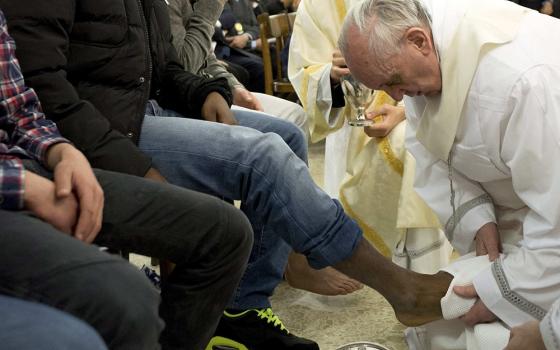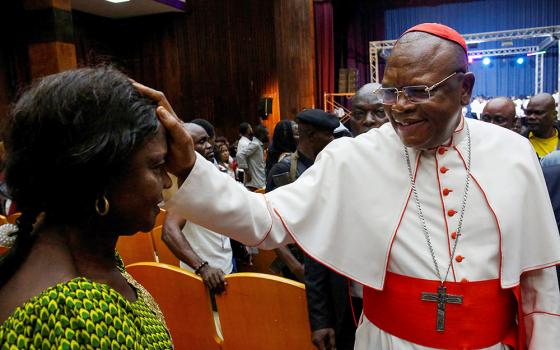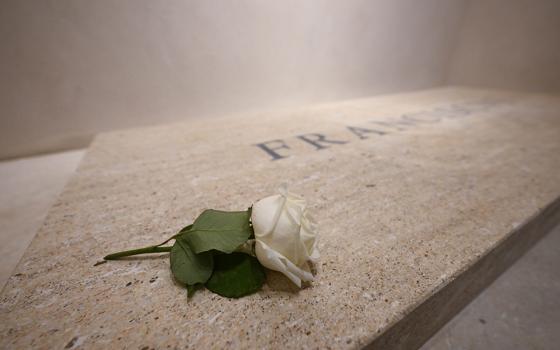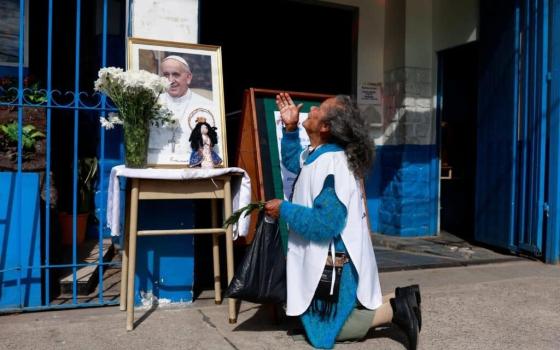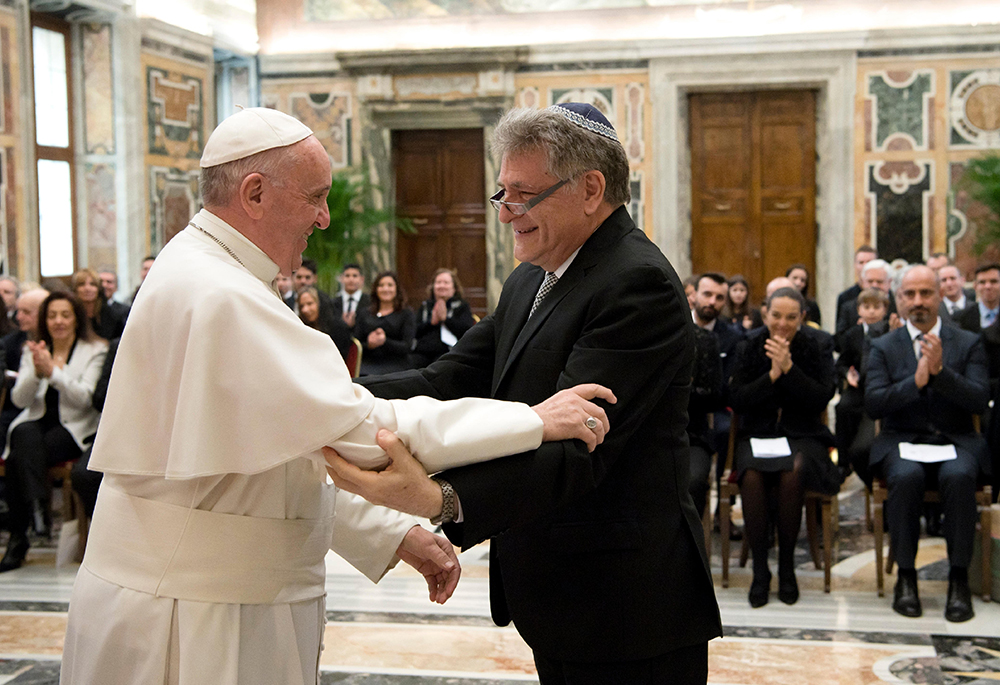
Pope Francis greets his longtime friend Rabbi Abraham Skorka during a meeting with an interreligious group of scholars at the Vatican Feb. 23. Pope Francis died April 21, 2025, at age 88. Rabbi Shmuly Tanklowitz writes that Francis "was the type of role model we want to see in the world." (CNS photo/L'Osservatore Romano)
For a rabbi, I have an especially personal relationship with Catholicism. My maternal grandparents were Catholic. They were wonderful people who introduced me to a truly positive, warm model of Catholicism. Their respect for my Jewish path was very moving. At some point in my childhood, they sat down with my interfaith parents and said, "Look, we don't care which way you go, we just feel the value of religion in the home." That was an instrumental moment in my life. Years later, I remember speaking to them from my yeshiva in Israel, and them saying how proud they were of me.
I heard of Pope Francis' passing with great sadness. Last year, his team invited me to the Vatican for a conference on ethics. The gathering was postponed, and I regret that the opportunity was lost, but I nonetheless appreciated the generosity of the invitation.
In a world of greed and obsession with power, it is rare to see someone use their power to humbly help the downtrodden as Pope Francis did, whether it was in symbolic acts such as washing feet, or through advocacy for the disenfranchised. He was the type of role model we want to see in the world.
In addition to his consistent and tireless care for the vulnerable, Pope Francis was a true defender of the environment. He regularly warned the world of the dangers of environmental destruction and climate change. He continued the papal legacy of animal advocacy, including calling for meat reductionism. "We read in the Gospel that Jesus says of the birds of the air that 'not one of them is forgotten before God,' " Pope Francis wrote in the 2015 encyclical letter. "How then can we possibly mistreat them or cause them harm?"
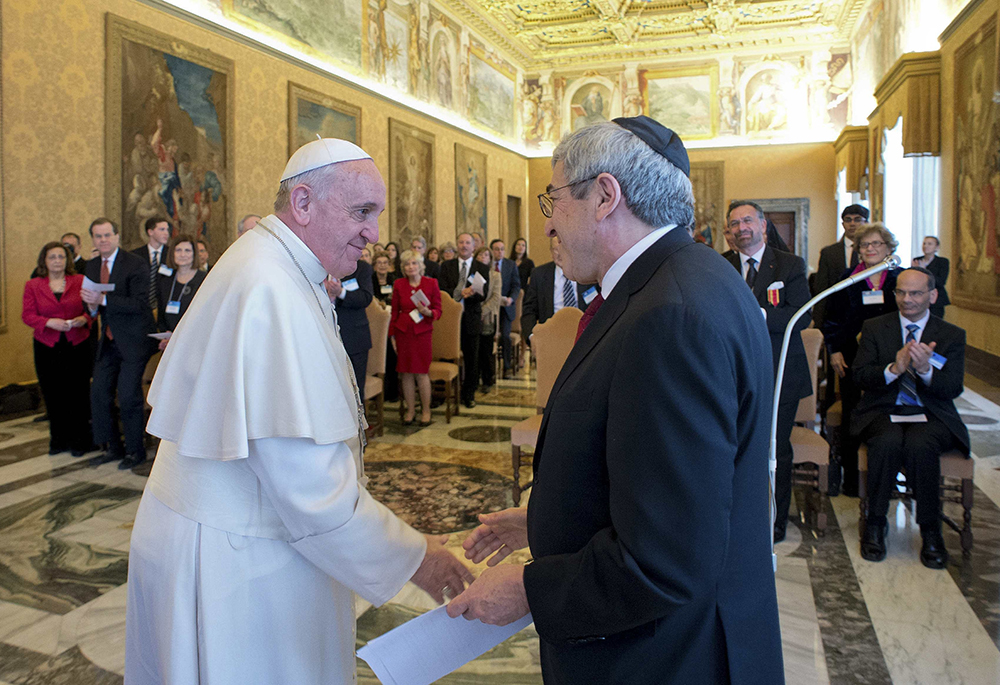
Pope Francis greets Stanley Bergman, president of the American Jewish Committee, during a meeting at the Vatican on Feb. 13, 2014. The pope said then that the modern relationship between Jews and Catholics has a "theological foundation" and is "not simply an expression of our desire for reciprocal respect and esteem." (CNS/Reuters/L'Osservatore Romano)
As someone who holds the Jewish value of tikkun olam (repairing the world) and a theology of tzelem Elokim (that all humans are created with infinite dignity in the image of God) I was inspired by his work to advance sensitivities toward women's rights and standing up for the dignity of queer people. And as a traditionalist myself, I deeply appreciated Pope Francis' approach to move reproductive rights and LGBTQ issues forward in small but significant ways, e.g., offering some acknowledgement of same-sex couples. I appreciated his nuance in these progressive stances; that said, many conservative Catholics were alienated by his attitudes. I can relate, as an Orthodox rabbi who leans progressive on many issues, to the challenges of holding together a big tent while also advancing causes of solidarity.
The Jewish relationship with the Vatican generally, and this pope in particular, is complex. Certainly, there was blood on the hands of the church during the Holocaust and in centuries prior. In the latter half of the 20th century, important measures of repair were enacted. The first was the groundbreaking Nostra Aetate declaration proclaimed by Pope Paul VI in 1965, which stated that Judaism is a valid pathway toward God and renounced antisemitism. Also seismic was Pope John Paul II's acknowledgement of the persecution of the Jews and the Catholic Church's involvement with the Holocaust.
The respect is mutual. As a religious pluralist, I in turn view Catholicism as a valid and cherished pathway to God. This is rooted in three Torah covenants: the Noahic, which is universal; the Abrahamic, which gave birth to the three monotheistic faiths; and the covenant at Sinai, which gave us the Ten Commandments revered by both Jews and Christians as central to morality.
To be sure, for this pope, Catholic religious pluralism wasn't only the embracing of Judaism. In one of the pope's last speeches on interfaith relations (in Singapore in September 2024) he shared that "All religions are paths to God." He added, "There is only one God, and religions are like languages, paths to reach God."
Advertisement
Pope Francis himself was a longtime friend of the Jews, calling antisemitism "a sin against God." His noted friendship with Rabbi Abraham Skorka was exemplary of his open heart. As Jews, we not only offer sympathy to Catholics worldwide, but mourn this enormous loss along with them.
I must note that in the last year and a half, many Jews around the world felt abandoned by Pope Francis. Those who admired him for his work with the poor and the environment felt devastated to see the image of baby Jesus in a keffiyeh. Such an image plays into the very replacement theology that the Vatican disavowed in 1965 — denying the Jewish roots in the Holy Land and the Jewish roots of Christianity. His decision not to denounce that charged nativity scene was experienced by many as a hostile act in the midst of a brutal war, compounding Jewish heartbreak.
To be clear, the pope had a legacy of pacifism that I respect. Certainly, there are many Jews who call for ceasefire; consistently, Israelis are on the streets protesting for a ceasefire as a pathway to the return of the hostages. Pope Francis himself consistently advocated for the release of the hostages, and was certainly concerned for the small community of Christian Gazans caught up in the war.
That is not the issue. The issue is the erasure of Jesus' Jewish identity, which is a blow to the repair ongoing in Jewish-Catholic relations. Such an act left the majority of Jews — and certainly almost all Israelis — with the painful sense that we had been forsaken. Israelis, and Jewish leaders around the world, felt the pope, in the last months of his life, used inaccurate and dangerous language to describe Israeli defense against the brutalities of Hamas terror.
Pope Francis believed in the sanctity of human life and the imperative of peace. His was a vision of religion that was at once particularistic and universalistic. He spoke to all of humanity when he spoke to Catholics, and he did so without proselytizing. As Jews, we can be inspired by a model of discourse that uses both the particular language of our faith, and the universal concern for the suffering of all creation.
The Jewish hope is that the next pope will continue the promising trajectory of inclusion in the Catholic Church, while also rebuilding the sensitive and damaged Jewish relationship. Whoever leads next will have a true challenge: How to lead with the nuance that allows for progress without the fracturing of the Catholic community? How to navigate taking moral sides in conflicts while also holding onto allyship everywhere to some degree? These are the questions that will shape the future of the Vatican. Our prayers are with you.


